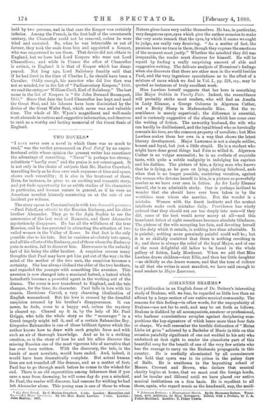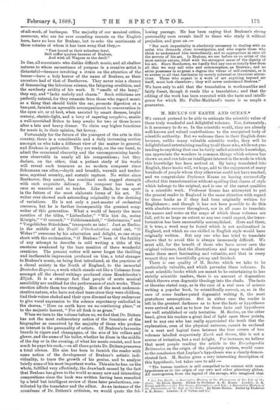JOHANNES BRAHMS.*
THE publication in an English dress of Dr. Deiters's interesting study of Brahms, will, we fear, be regarded as little less than an affront by a large section of our native musical community. The reasons for this feeling—in other words, for the unpopularity of Brahms—are not far to seek, and may be set forth as follows. Brahma is disliked by all accompanists, amateur or professional, who harbour conscientious scruples against deciphering com- positions the key-signature of which bears more than four flats or sharps. We well remember the terrible dislocation of "Moine Liebe ist grim" achieved by a Bachelor of Music (a title on this occasion painfully significant of one not wedded to his art) who undertook at first sight to render the pianoforte part of this beautiful song for the benefit of one of the very few artists who has the courage to carry on the Brahmsic propaganda in this country. He is cordially abominated by all connoisseurs who hold that opera was in its prime in the palmy days of Balfe. He is anathema to the boycotting school of Messrs. Crowest and Brown, who declare that musical charity begins at home, that we must oust the foreign horde, and be insular and illiberal until we have placed our native musical institutions on a firm basis. He is repellent to all those, again, who regard music as the handmaid, nay, the maid- • Johannes Brahma: a Biographical Sketch. By Dr. Hermann Deiters. Trans- lated, with Additions, by Rosa Newman:lb. Edited, with a Preface, by J. A. Fuller-Maitland. London : Fisher
of-all-work, of burlesque. The majority of our musical critics, moreover, who are for ever sounding sonnets on the English horn, have no love for Brahma, but re-echo the sentiments of those coteries of whom it has been sung that they,—
" Fast bound at their suburban level,
Still suffer qualms because of Brahms,
And wish all Wagner at the devil."
In fine, all exeoutants who dislike difficult music, and all shallow natures to whom earnestness of purpose in a creative artist is distasteful—because involving a strain on the attention of the hearer—have a holy horror of the name of Brahms, as their ancestors had of that of Beethoven. They never miss a chance of denouncing the laborious science, the fatiguing erudition, and the sawdusty aridity of his work. It "smells of the lamp," they say, and "lacks melody and charm." Such criticisms are perfectly natural, for they emanate from those who regard music as a thing that should tickle the ear, promote digestion at a banquet, furnish an agreeable accompaniment to conversation in the open air, or at best, when assisted by smart dresses, bright scenery, electric-light, and a bevy of capering coryphees, enable a well-nourished Briton to keep awake for two or three hours after a late and heavy dinner. To claim any higher functions for music is, in their opinion, flat heresy.
Fortunately for the future of the youngest of the arts in this country, there is a considerable and a daily increasing section amongst us who take a different view of the matter in general, and Brahma in particular. They are ready, on the one hand, to admit the occasional obscurity and the uncompromising harsh- ness observable in nearly all his compositions ; but they declare, on the other, that a patient study of his works will reveal such treasures as no modern composer since Schumann can offer,—depth and breadth, warmth and tender- ness, mystical serenity, and ecstatic rapture. No writer since Beethoven, they assert, has combined such rugged strength with such exquisite delicacy. No composer has been at once so massive and so tender. Like Bach, he can sport in the fetters of the most elaborate forms of his art. No writer ever showed such astounding originality in the devising of variations. He is not only a past-master of orchestral resource, but he is further incomparably the greatest song- writer of this generation. What a world of beauty the mere mention of the titles, " Liebeslieder," "Wie bist du, meine Konigin," "0 versenk," " Feldeinsamkeit," " Geheimniss," and " Vergebliches Standchen," transports us into ! Just as Berlioz in the middle of his Traits d'Orchestration cried out, "0 Weber !" overcome by his admiration and delight, so one stops short with the exclamation, "0 Brahms !" born of the futility of any attempt to describe in cold writing a tithe of the emotions awakened by the bare mention of these wonderful creations. The present writer will never forget the thrilling and ineffaceable impression produced on him, a total stranger to Brahms's music, on being first introduced, at the practices of a choral society in the North of England, to the immortal Deutsches Requiem, a work which stands out like a Colossus from amongst all the choral writings produced since Mendelssohn's Elijah. It is a strange fact that people of acute musical sensibility are unfitted for the performance of such works. Their emotion affects them too strongly. Men of the most undemon- strative nature, who have not shed tears since they were children, find their voices choked and their eyes dimmed as they endeavour to give vocal expression to the solemn expectancy embodied in the chorus, "Here on earth have we no continuing place," or to the majestic lament, "For all flesh is as grass."
When we turn to the volume before us, we find that Dr. Deiters has not the most rudimentary notion of the functions of the biographer as conceived by the majority of those who profess an interest in the personality of artists. Of Brahms's favourite brands in cigars and champagne, of the size of his collars and gloves, and the name of his tailor, whether he dines in the middle of the day or in the evening, of what his meals consist, and how much he pays his cook,—on all these points Dr. Deiters preserves a total silence. His aim has been to furnish the reader with some notion of the development of Brahms's artistic indi- viduality, to trace the growth of his genius, and to analyse briefly some of his most important works. This aim he has, on the whole, fulfilled very effectively, the drawback caused by the fact that Brahms has given to the world so many new and interesting compositions since the book was written having been remedied by a brief but intelligent review of these later productions, con- tributed by the translator and the editor. As an instance of the soundness of Dr. Deiters's criticism, we would quote the fol. lowing passage. He has been saying that Brahms's strong personality soon reveals itself to those who study it without prejudice, and goes on :—
"But snob impartiality is absolutely necessary in dealing with an artist who demands close investigation, and who repels those who think to understand him immediately, and to appropriate at once all the secrets of his art. In Brahms, we see before us an artist of the most serious nature, filled with the strongest sense of the dignity of his art. Since Beethoven, we hardly find any one so totally free from all that we may call trite and commonplace, as Brahms; and no artist possesses in so great a degree the virtue of self-restraint, or is so averse to all that fascinates by merely external or transient attrac- tions. Those who expect in a work of art anything beyond art itself, mast look elsewhere ; they will never understand Brahms.”
We have only to add that the translation is workmanlike and fairly fluent, though it reads like a translation ; and that the editing of the work has been executed with the taste and intelli- gence for which Mr. Fuller-lfaitland's name is so ample a guarantee.



































 Previous page
Previous page